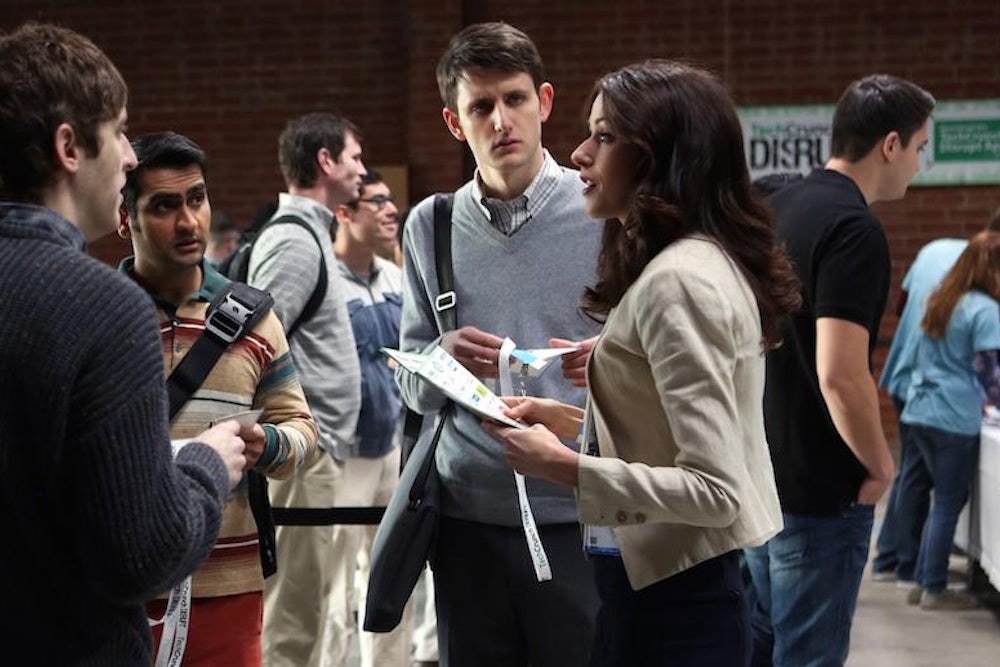“Normally the tech world is two percent female. For the next three days? 15 percent.” So says Monica, the only recurring female character on HBO’s “Silicon Valley,” which airs its season finale on Sunday night. Like many of the jokes on Mike Judge’s raunchy satire ofthe tech-world, this is meant to be a barbed shot at the real Silicon Valley. And it’s true, the tech industry is dominated by men who resemble bumbling coders like Richard (Thomas Middleditch) and entrepreneurial ego monsters like Erlich (T.J. Miller), the founders of fictional start-up Pied Piper. But if “Silicon Valley” aims to skewer these dysfunctions, it’s not doing a very good job of it; in its eight episode run, the show has ignored biting social commentary for sour, oblivious sexism.
When Kara Swisher, the well-known tech journalist, makes a brief cameo in Sunday’s finale, it’s striking—not because she’s a Silicon Valley celebrity, but because she’s one of the first smart, professional female characters to speak on the show. With few exceptions, the world of “Silicon Valley” is one where women are invisible. In the first six episodes, those exceptions include: a black stripper named Mochachino who intimidates the uncomfortable geeks; attractive actresses hired to chat up men at a tech party; and an engineer’s girlfriend, the object of sexual speculation by the rest of the guys as she strolls around in skimpy silk robes. Then there’s Monica (Amanda Crew), the uber-competent assistant to the eccentric billionaire investing in Pied Piper. (A character who is building his own island and seems not-so-subtly inspired by Peter Theil.) As the show’s only professional—just look at her pencil skirts and pumps and shiny, shiny hair—her job is mainly to maintain schedules and make hotel reservations and offer pep talks (tasks that are, of course, totally not gender-coded in any way). In Sunday’s finale, she briefly shifts out of her maternal role to suggest that she’ll be a romantic interest for Richard in the second season. Surprise!
I’ve noticed the subtle sexism of this show all spring, but it comes to a head at the end of its first season. Last week’s episode, along with Sunday’s finale, are set at TechCrunch Disrupt, a real-life convention where our protagonists will compete against other start-ups for money and glory. There are more women around, which poses a danger for our young geeks. “What a goddamn meat market,” says one. “[The Valley Wag party] was sick. There must have been, like, 12 girls there,” says another. All these women are potential distractions, a threat to the guys’ focus and success. One girl, who Richard once went on two dates with, tells other conference-goers that Richard is obsessed with her—leading to Richard actually become obsessed with her, and ignore the work he needs to do. Erlich provokes the rage of the contest’s judge by sleeping with the guy’s wife. Dinesh tries to sleep with a pretty blonde who asks every available man for help writing code for her cupcake app.
It’s not just that the show fails the Bechdel Test, that oft-cited rubric for spotting onscreen sexism. (Is there more than one woman, and do they talk to each other about something other than a man?) The show’s clichéd gender dynamics yield stale, hammy humor—“The Big Bang Theory” with dick jokes. (Actually, that comparison is unfair to BBT, which eventually added well-drawn, intelligent women to its cast.) “Rarely has a show had to do so little to find so much to mock,” wrote Slate’s Willa Paskin when the show premiered, referencing the self-satirizing nature of so much tech news. But the truth is, the show doesn’t do that much, settling instead for low-hanging fruit and filthy jokes. Has there been an episode of “Silicon Valley” as funny and sharp as this Jessica Pressler article about the start-ups aiming to disrupt laundry?
Just this past week, Google released its employee data, revealing that women are only 17 percent of its technical employees are women. These numbers are bad, but by “Silicon Valley” standards, they’re astonishingly high. If we’re to believe the show, the tech world is two percent female; in the real world, according to one study, tech companies employ an average of 12.33 percent women. Female programmers do exist, and a better show would feature one (or even two). Satire doesn’t lose its oomph when it injects a little progressivism—just look at The Onion, or “The Amy Schumer Show.”
Adding a few more women to the show wouldn’t just make it more representative—a show that included a piercing take on some of the ugly sexism that female engineers face would probably be funnier too. Watching “Silicon Valley,” it seems the greatest effect of Silicon Valley sexism and gender disparity is how hard it makes it for these guys to hook up with women. The jokes’ target is the pathetic, emasculated dudes, sex-starved nerds busy with dick-measuring contests—not the troubling system they’re a part of. Instead of skewering the tech world, the show merely reproduces its toxic mythologies.
